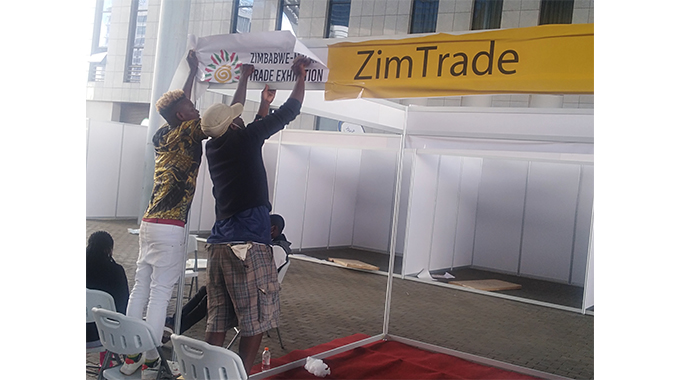Zim-Malawi Trade Exhibition kicks off

Prosper Ndlovu in Lilongwe, Malawi
THE Zimbabwe Malawi Solo Trade Exhibition kicks off here today with local companies seeking to expand their export market and increase foreign currency earnings for the economy.
The three-day expo is being co-ordinated by the country’s trade development and promotion agency, ZimTrade, in conjunction with the Malawi Investment and Trade Centre (MITC) and the Zimbabwean Embassy in Malawi under the theme “Fostering Trade Partnerships”.
About 30 local companies are expected to participate and by end of day yesterday some had already arrived at the Bingu Wamutharika International Conference Centre, where they have pitched their exhibition stands in readiness to engage with Malawian buyers.
The companies are drawn from fast-moving consumer goods, agricultural inputs and implements, household and office furniture, and building and construction sectors.
Zimbabwe’s Ambassador to Malawi, Dr Nancy Saungweme, conducted a pre-event tour of the company stands and expressed satisfaction with the turnout.
“I am so happy our companies are coming in numbers. There is a lot of export potential here,” she said while urging local producers to export more to Malawi, a market dominated by South African products.
Amb Saungweme also said Malawi has about 3 000 resident Zimbabweans, who are keen to consume local products and have also gone further to exploit business opportunities in the regional sister country.
The expo is being held under strict Covid-19 prevention protocols and buttresses the Second Republic’s thrust for robust economic development, which has seen a shift from traditional to economic diplomacy, which is expected to improve foreign currency and investment inflows.
“We are rolling and ready for engagement with Malawian buyers and we are hopeful there is a lot of potential in this market for Zimbabwean products,” said ZimTrade operations director, Mr Similo Nkala, who is part of the delegation.
“We already have a Bilateral Trade Agreement with Malawi and tomorrow ZimTrade will sign a memorandum of understanding (MoU) with MITC. Both countries are already part of the Sadc and Comesa trade treaties and now we have the African Continental Free Trade Area.
“With the disruption caused by Covid-19, this means there should be increased intra-regional trade and we really need to rely on each other as African states.”
In view of limitations on the hosting of trade fairs due to Covid-19, Mr Nkala said ZimTrade was focused on initiatives that promote trade such as outward trade missions and conducting export market surveys that assist local firms.
Under the National Development Strategy 1, a five-year blueprint launched last year, economic diplomacy is crucial to improving the country’s image, improving relations with the international community, as well as boosting investment.
The first ever trade promotion event in Lilongwe is expected to improve engagements between companies in the two countries where local companies will meet buyers of products and services, as well as suppliers of raw materials.
“So, the attention will be on Zimbabwe, which improves the quality of engagements between local exporters and buyers in the markets,” ZimTrade chief executive officer, Mr Allan Majuru, said earlier.
While cordial political relations exist between Lilongwe and Harare, Mr Majuru said there is room to translate this into economic gains by increasing trade and economic co-operation.
According to the Trade Map, total trade between Zimbabwe and Malawi fell from US$126 million in 2015 to US$51 million in 2019 and the balance of trade has been in favour of Malawi.
Zimbabwe’s main exports to Malawi in 2019 included corrugated paper and paperboard; coke and semi-coke of coal; cement; iron and steel structures; packing containers of paper, paperboard, cellulose wadding or webs of cellulose fibres; rough wood; agrochemicals; seeds, maize and fish.
Zimbabwe’s imports from Malawi include dried leguminous vegetables; soya-bean oil cake and other solid residues; unmanufactured tobacco; soya beans; groundnuts, maize, fibre board, manufactured tobacco, and plastic household articles.
In October last year President Mnangagwa met his Malawian counterpart, Lazarus Chikwera where discussions focused on how the two countries can harness their natural resources to improve the lives of their citizens through production and productivity.
The engagement afforded the two leaders and their Governments to refocus their cooperation in the areas of trade, agriculture, mining and social services.









Comments